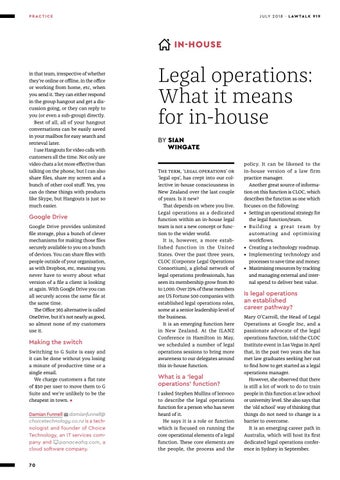PRACTICE
J u ly 2 0 1 8 · L AW TA L K 9 1 9
IN-HOUSE in that team, irrespective of whether they’re online or offline, in the office or working from home, etc, when you send it. They can either respond in the group hangout and get a discussion going, or they can reply to you (or even a sub-group) directly. Best of all, all of your hangout conversations can be easily saved in your mailbox for easy search and retrieval later. I use Hangouts for video calls with customers all the time. Not only are video chats a lot more effective than talking on the phone, but I can also share files, share my screen and a bunch of other cool stuff. Yes, you can do these things with products like Skype, but Hangouts is just so much easier.
Google Drive Google Drive provides unlimited file storage, plus a bunch of clever mechanisms for making those files securely available to you on a bunch of devices. You can share files with people outside of your organisation, as with Dropbox, etc, meaning you never have to worry about what version of a file a client is looking at again. With Google Drive you can all securely access the same file at the same time. The Office 365 alternative is called OneDrive, but it’s not nearly as good, so almost none of my customers use it.
Making the switch Switching to G Suite is easy and it can be done without you losing a minute of productive time or a single email. We charge customers a flat rate of $50 per user to move them to G Suite and we’re unlikely to be the cheapest in town. ▪
Damian Funnell damianfunnell@ choicetechnology.co.nz is a technologist and founder of Choice Technology, an IT services company and panaceahq.com, a cloud software company. 70
Legal operations: What it means for in-house BY SIAN WINGATE The term, ‘legal operations’ or ‘legal ops’, has crept into our collective in-house consciousness in New Zealand over the last couple of years. Is it new? That depends on where you live. Legal operations as a dedicated function within an in-house legal team is not a new concept or function to the wider world. It is, however, a more established function in the United States. Over the past three years, CLOC (Corporate Legal Operations Consortium), a global network of legal operations professionals, has seen its membership grow from 80 to 1,000. Over 25% of these members are US Fortune 500 companies with established legal operations roles, some at a senior leadership level of the business. It is an emerging function here in New Zealand. At the ILANZ Conference in Hamilton in May, we scheduled a number of legal operations sessions to bring more awareness to our delegates around this in-house function.
What is a ‘legal operations’ function? I asked Stephen Mullins of lexvoco to describe the legal operations function for a person who has never heard of it. He says it is a role or function which is focused on running the core operational elements of a legal function. These core elements are the people, the process and the
policy. It can be likened to the in-house version of a law firm practice manager. Another great source of information on this function is CLOC, which describes the function as one which focuses on the following: • Setting an operational strategy for the legal function/team. • Build in g a g rea t t ea m by automating and optimising workflows. • Creating a technology roadmap. • Implementing technology and processes to save time and money. • Maximising resources by tracking and managing external and internal spend to deliver best value.
Is legal operations an established career pathway? Mary O’Carroll, the Head of Legal Operations at Google Inc, and a passionate advocate of the legal operations function, told the CLOC Institute event in Las Vegas in April that, in the past two years she has met law graduates seeking her out to find how to get started as a legal operations manager. However, she observed that there is still a lot of work to do to train people in this function at law school or university level. She also says that the ‘old school’ way of thinking that things do not need to change is a barrier to overcome. It is an emerging career path in Australia, which will host its first dedicated legal operations conference in Sydney in September.
